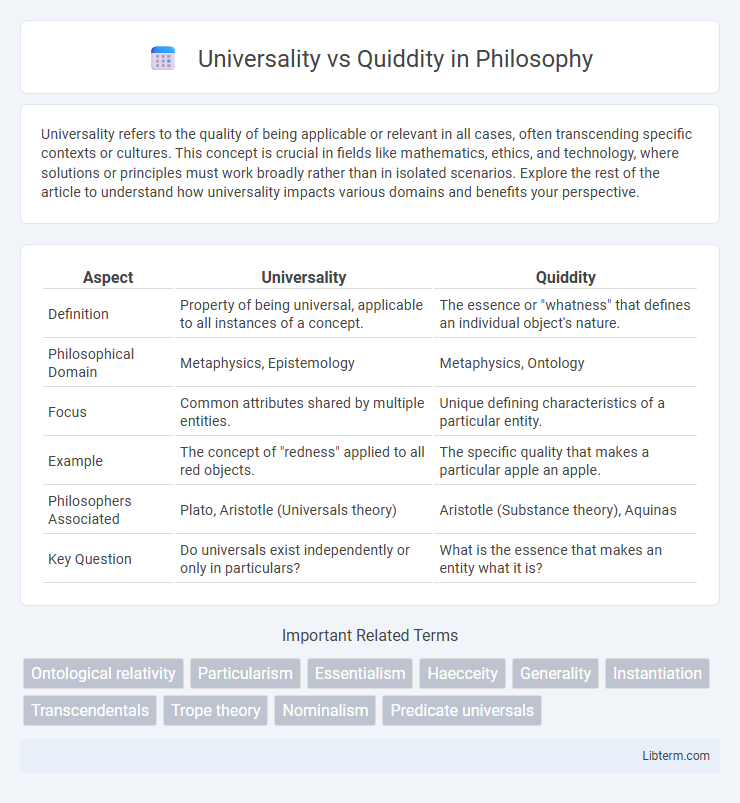Universality refers to the quality of being applicable or relevant in all cases, often transcending specific contexts or cultures. This concept is crucial in fields like mathematics, ethics, and technology, where solutions or principles must work broadly rather than in isolated scenarios. Explore the rest of the article to understand how universality impacts various domains and benefits your perspective.
Table of Comparison
| Aspect | Universality | Quiddity |
|---|---|---|
| Definition | Property of being universal, applicable to all instances of a concept. | The essence or "whatness" that defines an individual object's nature. |
| Philosophical Domain | Metaphysics, Epistemology | Metaphysics, Ontology |
| Focus | Common attributes shared by multiple entities. | Unique defining characteristics of a particular entity. |
| Example | The concept of "redness" applied to all red objects. | The specific quality that makes a particular apple an apple. |
| Philosophers Associated | Plato, Aristotle (Universals theory) | Aristotle (Substance theory), Aquinas |
| Key Question | Do universals exist independently or only in particulars? | What is the essence that makes an entity what it is? |
Understanding Universality: A Conceptual Overview
Universality refers to the quality or state of being universal, applying to all instances of a particular category or concept without exception. It encompasses abstract properties or principles that are consistent across different contexts, enabling shared understanding and classification. This concept contrasts with quiddity, which focuses on the unique essence or specific characteristics that distinguish individual entities.
Defining Quiddity: Essence and Distinctiveness
Quiddity refers to the essence or "whatness" of an entity that defines its unique characteristics and distinguishes it from other beings. It captures the intrinsic nature that makes a thing exactly what it is, separate from its existence or external attributes. This concept emphasizes the qualitative identity at the core of an object, contrasting with universality, which pertains to properties shared across multiple entities.
Philosophical Roots: Universality and Quiddity in History
Universality and quiddity trace their philosophical roots to classical metaphysics, particularly in the works of Plato and Aristotle, where universals represent abstract properties shared across multiple entities, and quiddity denotes the unique essence or "whatness" of an individual object. Medieval Scholastic philosophers like Thomas Aquinas further developed these concepts, emphasizing universals as concepts existing in the mind and quiddity as the specific nature defining an object's individuality. The historical debate between realism and nominalism centers on the ontological status of universals, highlighting enduring tensions in understanding the relationship between generality and particularity in philosophy.
Universality in Science and Logic
Universality in science and logic refers to the principle that certain laws, theories, or logical truths apply consistently across all contexts and instances, enabling generalization and prediction. Scientific laws, such as Newton's laws of motion, demonstrate universality by holding true regardless of time or location, while in logic, universal statements assert properties that apply to every element within a specified domain. This concept facilitates the development of universal theories and formal systems that underpin empirical research and rigorous reasoning.
The Role of Quiddity in Metaphysics
Quiddity, or the "whatness" of a thing, plays a crucial role in metaphysics by defining the intrinsic nature that distinguishes one entity from another within a category. Unlike universality, which abstracts common properties shared across multiple instances, quiddity captures the unique essence that constitutes an individual object's identity and existence. This focus on quiddity enables metaphysical inquiry to address the fundamental question of what things are in themselves, beyond mere classification or resemblance.
Universality vs. Quiddity: Core Differences
Universality refers to properties or concepts that apply broadly across multiple instances, emphasizing common features shared by different entities. Quiddity, also known as "whatness," focuses on the unique essence or nature that defines an individual entity's distinct identity. The core difference lies in universality capturing general characteristics existing in many objects, whereas quiddity highlights the singular, defining traits that make something specifically what it is.
Applications in Language and Semiotics
Universality and quiddity play crucial roles in language and semiotics by shaping how meaning is constructed and interpreted across cultures. Universality refers to common features or concepts shared by all languages, such as basic emotions or spatial relations, enabling cross-linguistic communication and cognitive understanding. Quiddity emphasizes the unique, essence-driven qualities of specific signs or expressions, highlighting cultural particularities and the nuanced representation of meaning in localized semiotic systems.
Universality and Quiddity in Contemporary Thought
Universality refers to the concept that certain properties or truths apply universally across all instances, emphasizing commonalities beyond individual differences. Quiddity, in contemporary thought, highlights the essence or "whatness" that distinguishes each particular entity or concept, focusing on specific defining characteristics. Modern philosophical discourse explores the tension between universality's broad applicability and quiddity's unique individuality in understanding identity and meaning.
Debates and Critiques: Balancing Essence and Generality
Debates on universality versus quiddity center on the tension between the general essence shared by categories and the unique nature of individual entities, challenging philosophers to balance abstract concepts with concrete realities. Critics argue that an overemphasis on universals risks neglecting the distinctiveness of particular beings, while focusing too much on quiddity may undermine the meaningful classification of knowledge. This dialectic fuels ongoing discussions in metaphysics about how best to reconcile the essence of things with their singular identities.
The Future of Universality and Quiddity in Philosophy
The future of universality in philosophy hinges on its ability to bridge diverse cultural perspectives while maintaining core ethical principles applicable across contexts. Quiddity, emphasizing the essence of individual entities, challenges universality by underscoring unique ontological characteristics that resist generalization. Philosophical discourse is increasingly blending these concepts, advocating for a dynamic interplay where universal frameworks accommodate the nuanced particularities of quiddity, shaping more inclusive and adaptable epistemologies.
Universality Infographic

 libterm.com
libterm.com